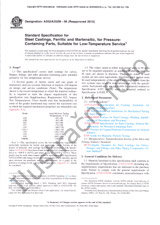Potřebujeme váš souhlas k využití jednotlivých dat, aby se vám mimo jiné mohly ukazovat informace týkající se vašich zájmů. Souhlas udělíte kliknutím na tlačítko „OK“.
ASTM D5881-20
Standard Practice for (Analytical Procedures) Determining Transmissivity of Confined Nonleaky Aquifers by Critically Damped Well Response to Instantaneous Change in Head (Slug)
Přeložit název
NORMA vydána dne 1.6.2020
Informace o normě:
Označení normy: ASTM D5881-20
Datum vydání normy: 1.6.2020
Kód zboží: NS-997607
Počet stran: 10
Přibližná hmotnost: 30 g (0.07 liber)
Země: Americká technická norma
Kategorie: Technické normy ASTM
Kategorie - podobné normy:
Anotace textu normy ASTM D5881-20 :
Keywords:
aquifer, aquifer tests, ground water, hydraulic conductivity, observation wells, slug test, storage coefficient, transmissivity,, ICS Number Code 07.060 (Geology. Meteorology. Hydrology)
Doplňující informace
| Significance and Use | ||||||||||||
|
6.1 The assumptions of the physical system are given as follows: 6.1.1 The aquifer is of uniform thickness, with impermeable upper and lower confining boundaries. 6.1.2 The aquifer is of constant homogeneous porosity and matrix compressibility and constant homogeneous and isotropic hydraulic conductivity. 6.1.3 The origin of the cylindrical coordinate system is taken to be on the well-bore axis at the top of the aquifer. 6.1.4 The aquifer is fully screened. 6.1.5 The well is 100 % efficient, that is, the skin factor, f, and dimensionless skin factor, 6.2 The assumptions made in defining the momentum balance are as follows: 6.2.1 The average water velocity in the well is approximately constant over the well-bore section. 6.2.2 Frictional head losses from flow in the well are negligible. 6.2.3 Flow through the well screen is uniformly distributed over the entire aquifer thickness. 6.2.4 Change in momentum from the water velocity changing from radial flow through the screen to vertical flow in the well are negligible. Note 1: Slug and pumping tests implicitly assume a porous
medium. Fractured rock and carbonate settings may not provide
meaningful data and information.
Note 2: The function of wells in any unconfined setting in a
fractured terrain might make the determination of k problematic
because the wells might only intersect tributary or subsidiary
channels or conduits. The problems determining the k of a channel
or conduit notwithstanding, the partial penetration of tributary
channels may make a determination of a meaningful number difficult.
If plots of k in carbonates and other fractured settings are made
and compared, they may show no indication that there are conduits
or channels present, except when with the lowest probability one
maybe intersected by a borehole and can be verified, such problems
are described by Note 3: The quality of the result produced by this standard is
dependent on the competence of the personnel performing it, and the
suitability of the equipment and facilities used. Agencies that
meet the criteria of Practice D3740 are generally considered capable of
competent and objective testing/sampling/inspection/etc. Users of
this standard are cautioned that compliance with Practice
D3740 does not in itself
assure reliable results. Reliable results depend on many factors;
Practice D3740 provides a
means of evaluating some of those factors.
|
||||||||||||
| 1. Scope | ||||||||||||
|
1.1 This practice covers determination of transmissivity from the measurement of water-level response to a sudden change of water level in a well-aquifer system characterized as being critically damped or in the transition range from underdamped to overdamped. Underdamped response is characterized by oscillatory changes in water level; overdamped response is characterized by return of the water level to the initial static level in an approximately exponential manner. Overdamped response is covered in Guide D4043; underdamped response is covered in Practice D5785/D5785M, Guide D4043. 1.2 The analytical procedure in this practice is used in conjunction with Guide D4043 and the field procedure in Test Method D4044/D4044M for collection of test data. 1.3 Limitations—Slug tests are considered to provide an estimate of the transmissivity of an aquifer near the well screen. The method is applicable for systems in which the damping parameter, ζ, is within the range from 0.2 through 5.0. The assumptions of the method prescribe a fully penetrating well (a well open through the full thickness of the aquifer) in a confined, nonleaky aquifer. 1.4 All observed and calculated values shall conform to the guidelines for significant digits and rounding established in Practice D6026. 1.4.1 The procedures used to specify how data are collected/recorded and calculated in this standard are regarded as the industry standard. In addition, they are representative of the significant digits that should generally be retained. The procedures used do not consider material variation, purpose for obtaining the data, special purpose studies, or any considerations for the user’s objectives; and it is common practice to increase or reduce significant digits of reported data to commensurate with these considerations. It is beyond the scope of this standard to consider significant digits used in analysis methods for engineering design. 1.5 Units—The values stated in SI units are to be regarded as standard. No other units of measurement are included in this standard. Reporting of results in units other than SI shall not be regarded as nonconformance with this standard. 1.6 This practice offers a set of instructions for performing one or more specific operations. This document cannot replace education or experience and should be used in conjunction with professional judgment. Not all aspects of the practice may be applicable in all circumstances. This ASTM standard is not intended to represent or replace the standard of care by which the adequacy of a given professional service must be judged, nor should this document be applied without the consideration of a project’s many unique aspects. The word “Standard” in the title of this document means only that the document has been approved through he ASTM consensus process. 1.7 This standard does not purport to address all of the safety concerns, if any, associated with its use. It is the responsibility of the user of this standard to establish appropriate safety, health, and environmental practices and determine the applicability of regulatory limitations prior to use. 1.8 This international standard was developed in accordance with internationally recognized principles on standardization established in the Decision on Principles for the Development of International Standards, Guides and Recommendations issued by the World Trade Organization Technical Barriers to Trade (TBT) Committee. |
||||||||||||
| 2. Referenced Documents | ||||||||||||
|
Odebírejte informace o nově vydaných normách ZDARMA:
Chcete pravidelně odebírat informace o nově vycházejících normách z celého světa a to zcela zdarma?
Přihlašte se k odběru. Vše je velice jednoduché a absolutně ZDARMA.
Na výběr máte vydavatele z celého světa.




 Cookies
Cookies
